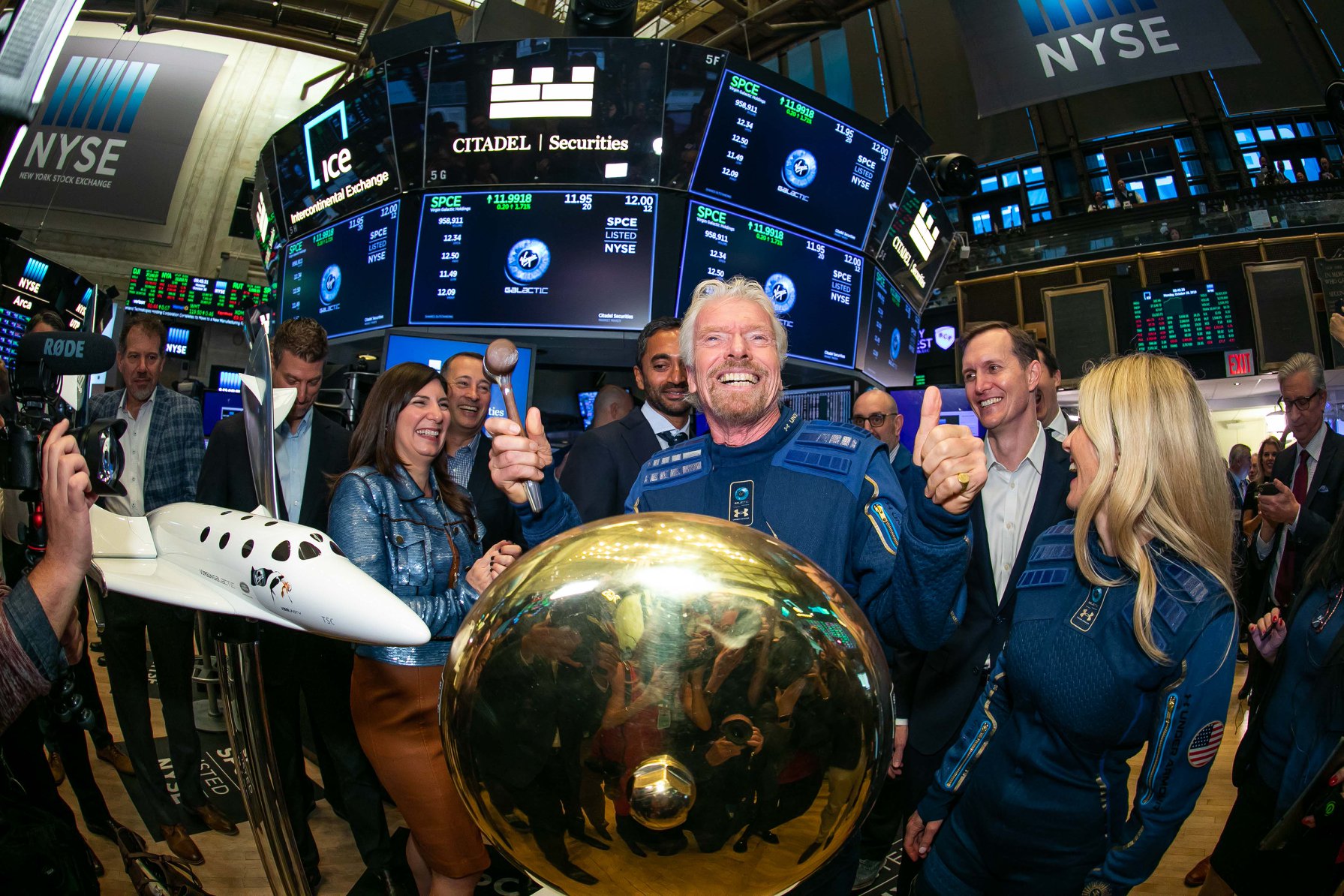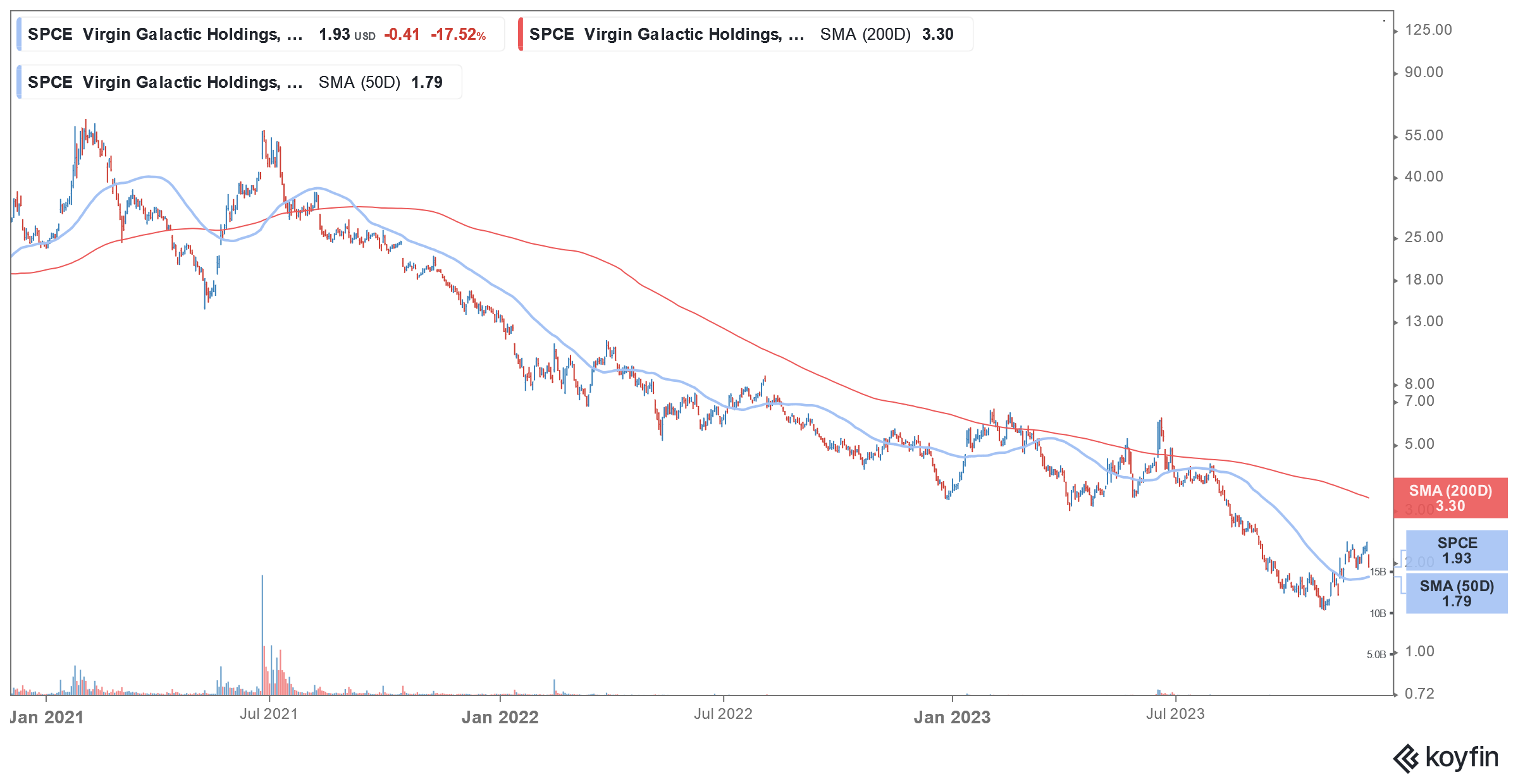
Virgin Galactic shares (NYSE: SPCE) shares fell over 17% in US price action yesterday and are trading lower in post markets also after Sir Richard Branson whose Virgin Investments owns over 7% stake in the space travel company ruled out more investments into the loss-making business.
Speaking with the Financial Times, Branson said, “We don’t have the deepest pockets after Covid, and Virgin Galactic has got $1bn, or nearly. It should, I believe, have sufficient funds to do its job on its own.”
Branson rules out more investments into Virgin Galactic
He however added that he was “still loving” the project and it “really proved itself and the technology” in space travel.
Virgin Galactic completed its successful test flight in 2021 which made Sir Richard Branson the first billionaire to reach space ahead of Jeff Bezos and Elon Musk. Bezos too later made his maiden space travel but Musk who owns SpaceX is yet to do so. That said, the expensive space travels of billionaires came at a time when the world was grappling with COVID-19 and millions globally were losing their jobs.
Notably, Virgin Investments was once the biggest stockholder of Virgin Galactic but sold the stake worth $1 billion between 2020 and 2021 which Branson used to fund some of his other business ventures.
Virgin Galactic went public through SPAC reverse merger
Virgin Galactic went public in 2019 after it merged with a Chamath Palihapitiya SPAC. It was the first company to merge with a Palihapitiya SPAC. Since then, he has taken Opendoor, Clover Health, and SoFi public through a reverse merger with his other SPACs.
However, the “SPAC king” dissolved two of his SPACs last year amid the crash in growth shares. All of the companies that merged with his SPACs trade below the IPO price of $10 and Virgin Galactic is the second worst performer after Clover Health which trades even below $1.
Virgin Orbit also filed for bankruptcy
Meanwhile, Branon’s comments about not putting more money in Virgin Galactic come nearly eight months after Virgin Orbit filed for bankruptcy. In its release announcing the bankruptcy, Virgin Orbit said, “While we have taken great efforts to address our financial position and secure additional financing, we ultimately must do what is best for the business.”
Notably, Virgin Orbit was spun out of Virgin Galactic in 2017 and went public in 2021 through a reverse merger with NextGen Acquisition Corp. II. Most of the companies that went public through the SPAC reverse merger are facing troubles and while some have already filed for bankruptcy, analysts expect some others to follow suit.
Meanwhile, Branson ruling out more financial support for Virgin Galactic should not be a big surprise for markets as investors have in general been shying from pouring more money into perennially loss-making ventures.
SPCE has over $1 billion in liquidity
Also, in its most recent update with releasing the Q3 2023 earnings Virgin Galactic sounded quite comfortable about its liquidity position. Its CEO Michael Colglazier said, “With six spaceflights successfully completed in under six months, Virgin Galactic has demonstrated the repeatability of our spaceflight system and also showcased the overwhelmingly positive experience of our Astronauts.”
He added, “With our third quarter cash and marketable securities position of approximately $1.1 billion, we forecast having sufficient capital to bring our first two Delta ships into service and achieve positive cash flow in 2026.”
Greg Konrad, analyst at investment bank Jefferies said that Virgin Galactic has learned its lessons with the failure of Virgin Orbit. He said, “This business is built to be operated at scale and by having flights on just Unity, you knew it wouldn’t reach the scale needed and cover its costs.”
SPCE provided a business update
Virgin Galactic also provided a business update during the Q3 call and said that the Spaceship factory in Phoenix, Arizona is on track for an opening in mid-2024. Similarly, the schedule for the Delta Class spaceships for revenues in 2026 is on track. It also added that the Galactic 6 mission is on track for January 2024.
The company admitted to tough market conditions and said, “We expect near term uncertainty in capital markets to continue as high interest rates persists and geopolitical unrest expands.”
It announced several measures to control the cash outflow. These included moving to a quarterly fight cadence for Unity’s future space missions instead of a monthly cadence. It also said that it would halt Unity space spaceflight in mid-2024.
Virgin also laid off 185 employees or around 18% of its workforce “to decrease its costs and strategically realign its resources. It believes that these layoffs would help it save around $25 million annually.
The company stressed, “our company’s financial growth is built around our production space ships, the Delta class, and we are shifting all company resources towards the safe, efficient and successful execution of this program.”
Morgan Stanley downgraded Virgin Galactic shares
Last month, Morgan Stanley downgraded Virgin Galactic shares from equal weight to underweight and cut the target price to $1.75. “SPCE is pausing revenue-generating space flights as it conserves cash and redoubles efforts on Delta. We like the company’s LT potential, but see limited opportunities for share price accretion during this upcoming lull period,” said Morgan Stanley analysts in their note.
They added, “Management is planning ~2 additional flights in 1H24, after which it will halt revenue-generating flight activity until the planned arrival of the first Delta-class ships in ~2026.”
Morgan Stanley analysts said that they see “more limited share price accretion potential during this lull relative to the rest of our coverage.”
The macro-environment has worsened
When Virgin Galactic went public, it was a different world altogether. With the interest rates now rising to multi-year highs and the macro environment looking quite challenging, loss-making growth companies like Virgin Galactic have fallen out of favour with investors.


Question & Answers (0)